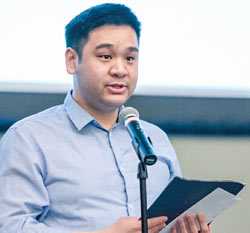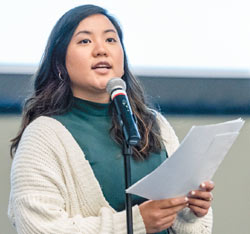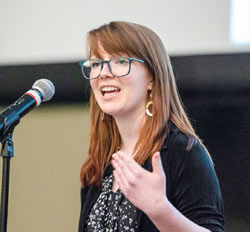Ignite | Spring 2022
A Mouthful of Hummingbirds
The patients of William Carlos Williams, M.D. (1883-1963) may not have known that he had another profession besides the family practice he sustained for 40 years in Rutherford, New Jersey. But it seems that Williams didn’t view writing poetry and healing people as an either/or proposition.
And that’s something that the top winners of NEOMED’s 40th annual William Carlos Williams Poetry Competition found tremendously validating.
“In med school we think there can be only one path and if you have any other interest, it can detract. This competition reminds me that there are programs like NEOMED that incorporate things like poetry and that it’s ok to have a creative outlet,” said first-place winner Thomas Nguyen at this year’s award ceremony, held in person at NEOMED for the first time since 2019. In his winning poem, “Here, the light is always fading,” Nguyen memorialized his grandmother’s last days, writing, “I remember your voice, a mouthful of hummingbirds, their beaks pointed skyward.”
POETRY CONTEST FOR MEDICINE STUDENTS
NEOMED holds an annual poetry contest, the William Carlos Williams Poetry Competition, for medical students across the country.
Prizes are awarded. Read about the William Carlos Williams Poetry Competition, including how to enter and poetry from past winners.
Being brought to campus for the annual poetry event gave three top winners a chance to spend time with likeminded students and faculty. Seeing a home for topics like narrative writing in the NEOMED curriculum, “I’m in awe of all the programming,” said third-place winner Anneka Johnston, a third-year student at Loyola University Chicago’s Stritch School of Medicine.
More a necessity than a hobby
“All three of us write poetry to make sense of the wild and crazy things we experience as medical students. To me, poetry is more a necessity than a hobby,” said second-place winner Amelia Khoo, who — like Nguyen — is a third-year medical student at Texas A&M University College of Medicine. “Coming from a poetry mindset makes me more attentive to details that make me a better physician, too.”
Graphic medicine
Keynote speaker M.K. Czerwiec, a pioneer in the field of graphic medicine, told the students in the audience that she discovered while serving as a nurse in an HIV/AIDS unit in Chicago in the 1980s that making comics could help her process her feelings. When she was overwhelmed by the seriousness of the issues she helped patients cope with — and later, when she faced her mother’s cancer — she discovered solace in the pages of a notebook. Filling each piece of paper with simple drawings and captions gave her a place to unload each day’s heavy emotions — and make room for more.
Following are the three prize-winning poems from the 2022 competition. As always, the winning poems will be published in the Journal of Medical Humanities.
First-place winner
 Thomas Nguyen is a third-year medical
student at Texas A&M University College
of Medicine. He studied neuroscience and
poetry during his undergraduate years at
University of Texas-Austin and graduated
with an M.S. in narrative medicine from
Columbia University. He is fascinated
with the connection between healing and
writing and hopes to combine the two
as a physician-writer. His first collection
of poetry, Permutations of a Self, won the
2019 Robert Phillips Poetry Chapbook
Prize and was published in April 2020
by Texas A&M University Press. Other
poems of his have been featured in
Frontier Poetry, Nashville Review, Tinderbox
Poetry, and Bellevue Literary Review, among
other journals.
Thomas Nguyen is a third-year medical
student at Texas A&M University College
of Medicine. He studied neuroscience and
poetry during his undergraduate years at
University of Texas-Austin and graduated
with an M.S. in narrative medicine from
Columbia University. He is fascinated
with the connection between healing and
writing and hopes to combine the two
as a physician-writer. His first collection
of poetry, Permutations of a Self, won the
2019 Robert Phillips Poetry Chapbook
Prize and was published in April 2020
by Texas A&M University Press. Other
poems of his have been featured in
Frontier Poetry, Nashville Review, Tinderbox
Poetry, and Bellevue Literary Review, among
other journals.
Nguyen’s poem is a reflection on the final days of his grandmother’s life; how memory and grief change over time.
WEB EXTRA
*** *** ***
Here, the light is always fading
& the dead speak to us in flutters.
In the lull of our routines: mound of unwashed
pots, damp laundry line between magnolias.
When we crowded around my grandmother
lying in the hospital bed, her face was chiseled
alabaster, windless lake. By that time, her lungs
had turned to mycelium, her liver cracked asphalt.
Nodules bloomed like violet mouths. I knew
enough at twelve to know this story would end
with cathedrals of smoke, light through a veil.
The nurse asked for her name: bà ngoại, we said.
Bà ngoại, she’d say, gently, while combing
my grandmother’s hair, clipping her nails.
I watched my grandmother, who knew no English
& writhed underneath hospital sheets
whenever doctors & nurses entered, fall
into repose. Tenseless, like the sun nestling
within a distant field. Brief sanctum from tangled wires
& the incessant whir of machines.
There’s not much I remember after that. Or maybe,
there’s not much left. Cartographer of my grief
drawing whirlpools in the map I’ll later use
to retrace this time. I know now that memory takes
more than it gives. But I remember the noise foaming
at the edges of your mouth like a wash. & I remember
your voice, a mouthful of hummingbirds,
their beaks pointed skyward.
Second-place winner
 Amelia Khoo is a third-year medical
student in the EnMed program at Texas
A&M College of Medicine. She was born
and raised in Alameda, California, where
she cultivated a love for creative writing,
and attended Brown University for
undergraduate studies. There, she received
her B.S. in biomedical engineering, helped
edit and contribute to literary magazines,
and took as many poetry classes as
possible! She now lives in Houston, Texas
and is pursuing her M.D. and Master’s in
Engineering. Outside of poetry, Amelia
enjoys singing and ultimate frisbee!
Amelia Khoo is a third-year medical
student in the EnMed program at Texas
A&M College of Medicine. She was born
and raised in Alameda, California, where
she cultivated a love for creative writing,
and attended Brown University for
undergraduate studies. There, she received
her B.S. in biomedical engineering, helped
edit and contribute to literary magazines,
and took as many poetry classes as
possible! She now lives in Houston, Texas
and is pursuing her M.D. and Master’s in
Engineering. Outside of poetry, Amelia
enjoys singing and ultimate frisbee!
Just prior to the start of medical school, Khoo was diagnosed with thyroid cancer and found herself a patient as she underwent treatment. Her poem is a reflection on the role reversal she experienced when beginning rotations in the hospital.
WEB EXTRA
*** *** ***
bright
welled up with tears the first time I saw it (a
liver) all smooth jewel in sterile brightness
surprised I think by its proximity
by how peaceful she looked:
grip slackened eyes shut could have been sleeping -
although by now I know I must have been as mute
silent prayer frozen on my lips
whisked off into reliably dreamless sleep
someone else’s bread and butter
these days I look into the patient’s mirror and
a starched-coat reflection stares right back
wide-eyed and unfamiliar and green
mouth full of words I cannot understand
unless through my own greasy-haired
reflection adorned in hospital gown
consider: the only time the inside of a body is not pitch black
is when it is in need of repair or
being repaired and I have never known my insides to be so
bright. run my fingers
across the hypertrophic spots of my scar like
beads on a rosary (I think a medical student
closed me up but somehow
I don’t mind as much anymore)
Third-place winner
 Anneka Johnston grew up in West
Michigan and attended Kenyon College,
majoring in English with a special
certification in creative writing, and
minoring in chemistry. Continuing her
lifelong commitment to avoid sunny
weather, Johnston moved to Chicago
following graduation, and worked in a
Suboxone clinic at the height of Chicago’s
opioid epidemic. She began searching for
the common ground between medicine
and the humanities, and became
passionate about giving voice to patient
experiences through narrative art. She is
currently a third-year student at Loyola’s
Stritch School of Medicine and is planning
to pursue a career in psychiatry.
Anneka Johnston grew up in West
Michigan and attended Kenyon College,
majoring in English with a special
certification in creative writing, and
minoring in chemistry. Continuing her
lifelong commitment to avoid sunny
weather, Johnston moved to Chicago
following graduation, and worked in a
Suboxone clinic at the height of Chicago’s
opioid epidemic. She began searching for
the common ground between medicine
and the humanities, and became
passionate about giving voice to patient
experiences through narrative art. She is
currently a third-year student at Loyola’s
Stritch School of Medicine and is planning
to pursue a career in psychiatry.
Johnston’s poem is an exploration of how caretakers struggle to make meaning out of death.
WEB EXTRA
*** *** ***
CNA Clinicals Day #3
It was mud.
All mud. His language lost in pain
and loose teeth, and it may have been
important, may have been a plea
for a priest, a cigar, or forgiveness for
stealing his sister’s lunchbox, his brother’s
wife, and do you think we fill in
other people’s cracks to heal our own?
Some days, I drag soap over broken bodies
to convince myself that I am clean.
My instructor never turns their groans into stories.
She pokes a straw through his chapped lips
to shut him up, and has me hold his wrist
to feel how blood leaves the extremities
when the heart begins to scream, feel how
his pulse shakes like a wet, caged bird.
He jolts.
He’ll squirm less when he’s dead
my instructor jokes, and laughs
when my hands jump to cover his ears
betraying my need to protect this patient
from her sharp truth, her rough decree
that to the world, he is already unhearing
unseeing, unformed, already dispersed
beyond our reach, beyond revision
the way fire burns wood into ash
the way that ash and water
will forever be mud.

